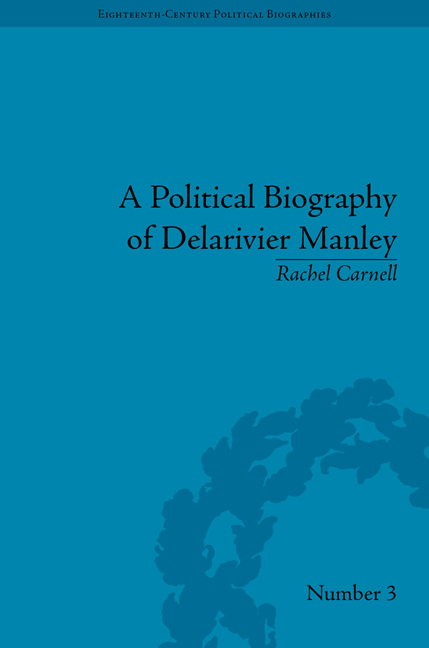Book contents
- Frontmatter
- CONTENTS
- The Author
- Dedication
- Acknowledgements
- A Note on Dates
- Manley Family Tree
- Introduction
- 1 ‘A Long Untainted Descent’: Her Father's Daughter?
- 2 Roger Manley: ‘A Scholar in the Midst of a Camp’
- 3 A ‘Liberal Education’: Youth and Early Life in London
- 4 A ‘Female Wit’: 1694–6
- 5 ‘Some More [and Less] Profitable Employ’: 1697–1705
- 6 Not Yet a Propaganda Writer: 1705–8
- 7 ‘[T]hrowing the First Stone’: 1709
- 8 Writing under a Tory Ministry: 1710–14
- 9 A Celebrated ‘Muse’: 1714–24
- Notes
- Works Cited
- Index
Introduction
- Frontmatter
- CONTENTS
- The Author
- Dedication
- Acknowledgements
- A Note on Dates
- Manley Family Tree
- Introduction
- 1 ‘A Long Untainted Descent’: Her Father's Daughter?
- 2 Roger Manley: ‘A Scholar in the Midst of a Camp’
- 3 A ‘Liberal Education’: Youth and Early Life in London
- 4 A ‘Female Wit’: 1694–6
- 5 ‘Some More [and Less] Profitable Employ’: 1697–1705
- 6 Not Yet a Propaganda Writer: 1705–8
- 7 ‘[T]hrowing the First Stone’: 1709
- 8 Writing under a Tory Ministry: 1710–14
- 9 A Celebrated ‘Muse’: 1714–24
- Notes
- Works Cited
- Index
Summary
Delarivier Manley (c. 1670–1724) was a satirist for the Tories during the reign of Queen Anne (1665–1714) and an important member of Robert Harley's propaganda team from 1711 to 1714 when Harley (1661–1724) was Chancellor of the Exchequer and Lord Treasurer, in essence, ‘prime minister’ of Great Britain. In 1711 Manley replaced Jonathan Swift as editor of the Tory periodical the Examiner. Moreover, her best-selling political scandal chronicle, Secret Memoirs and Manners of Several Persons of Quality, of Both Sexes. From the New Atalantis, an Island in the Mediterranean (1709), probably helped bring down the Whig government in 1710 and influenced the development of the novel in Britain. Despite these achievements, Manley has been both neglected and misunderstood by subsequent generations.
Modern readers who know of Manley may have heard of her through a passage in Alexander Pope's The Rape of the Lock (1712, 1714), in which Pope (1688–1744) uses the sustained popularity of Manley's The New Atalantis as an ironic measure for time immemorial. The thief of Belinda's lock proclaims: ‘Let Wreaths of Triumph now my Temples twine, / …. As long as Atalantis shall be read’. This line at once acknowledges the immense popularity of Manley's most famous work five years after its initial publication and, through its mock heroic tone, conveys ironic scepticism about its future popularity. In fact, readers in later decades did lose touch with the court and society scandals from Anne's reign, and Manley's works were largely out of print by the end of the eighteenth century. However, rather than dismissing Manley's importance because her political satire stayed in print for less than a century, we might instead be impressed that a work of satire as topical as The New Atalantis was not only translated into several languages within the first few years of its publication but was issued in new editions in 1735 and 1740, the last one over three decades after its initial publication and a decade and a half after Manley's death.
There was clearly something about Manley's innovative approach to political satire that resonated with the public long after its immediate topicality had faded.
- Type
- Chapter
- Information
- A Political Biography of Delarivier Manley , pp. 1 - 6Publisher: Pickering & ChattoFirst published in: 2014



